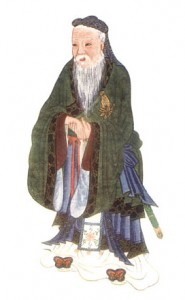| Confucius | |
|---|---|
 |
|
| Ancient Philosopher | |
| Specialty | Confucianism |
| Born | 551 BC Zou, Lu state |
| Died | 479 BC (at age 71-72) Lu State |
| Nationality | Chinese |
Of the many renowned Chinese philosophers, none were as influential and as endearing as Confucius. Among the reasons why Confucius was such a popular figure can be seen in his works. Confucius was not a man who labored over esoteric topics. Rather, he focused his writings on morality, proper behavior, political theories, and subjects that had timeless appeal.
Uncertain Beginnings
In Greek antiquity, many legendary philosophers attended formal institutions for the purpose of learning and expanding on prior philosophical belief. Confucius did not follow this path. Rather, Confucius grew up mostly in poverty and earned a living performing menial tasks and jobs, including shepherding.
The ability to piece together the early life of Confucius is very difficult since written records were never kept. Facts about his life were repeated via oral tradition among his followers. It is believed that he was born in Zou in the state of Lu circa 551 B.C.
Life in Lu
The formal education of Confucius is really not known. It is likely he studied Taoism under a popular mystic and also learned Chinese music. When he reached middle age, Confucius amassed disciples who began to become politically active in Lu, which was a city that was suffering from a great deal of political instability at the time Confucius lived there. The number of disciples he had is not known. Many sources that list huge numbers of followers are likely highly exaggerated as so many accounts of Confucius’ life are treated as myth.
Lu was run by three aristocratic families and Confucius began to catch their attention. The philosopher was centering his teaching on subjects related to righteousness and proper conduct. The families saw the value in these traits because they knew government officials who embodied these traits would provide greater legitimacy and a lot of loyalty from the populace.
In 501 B.C., Confucius was made the governor of a town, although it seemed to be a minor position because the town was so small. He eventually became the Minister of Crime. How important of a position this might have been is not really known. The position likely was a minor one since levying fines and penalties was not exactly his area of expertise.
At some point, political upheavals in Lu led Confucius to go into exile. He wandered around the regions surrounding Lu for quite some time. Perhaps during this time period, he was able to better formulate many of his political and philosophical belief systems. Eventually, he returned from exile and commenced teaching.
Works and Philosophy
 The Analects of Confucius is a collection of the great sayings of the philosopher and perhaps some of his students. Confucius did not write the Analects, as this was a task completed by his followers. In this work, the themes of Confucianism are presented. Some do consider Confucianism a religion while others see it as more of a philosophical approach to life.
The Analects of Confucius is a collection of the great sayings of the philosopher and perhaps some of his students. Confucius did not write the Analects, as this was a task completed by his followers. In this work, the themes of Confucianism are presented. Some do consider Confucianism a religion while others see it as more of a philosophical approach to life.
A great deal of this philosopher’s works centered on ethics and moral behavior. Confucius did try to lead people towards taking the right actions in life that would allow them to live a moral and just existence. Many of these teachings were in accordance with traditional Chinese cultural beliefs, but Confucius had his own unique way of presenting them.
One of the more interesting aspects of Confucianism is that it stresses ethics to the self. To a degree, Confucianism stresses consistent learning and the path to self-improvement.
Confucius also stressed the importance of a government to rule justly over its people and to also embody proper ethical and moral actions. In a sense, Confucius was promoting what would become known as the social contract during the Age of Enlightenment, which would not occur for hundreds of years.
Death and Legacy of Confucius
Confucius likely passed away around 479 B.C. After his death, his disciples carried on with his teachings. As a result, his thoughts were collected in book form and preserved for time. For many years, his disciples were awarded positions in the government. This alone is a testament to the value the ruler in ancient China placed in his teachings.